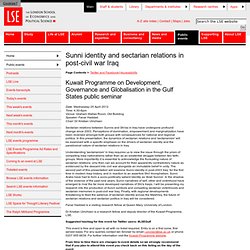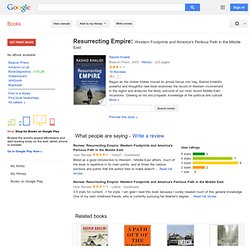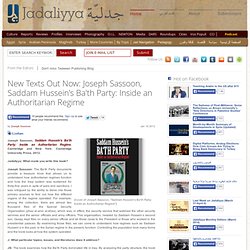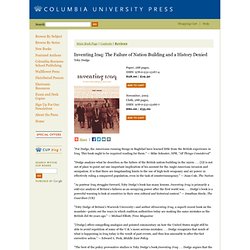

Memories of State - Eric Davis. Sectarianism in Iraq - Fanar Haddad. Review 'Haddad should be applauded not only for opening the door on further research on the subject but also for killing off the taboo hanging over sectarianism.

Particularly with Syria in mind, shining the light on the relationship between sectarianism and nationalism is a key factor in mitigating and managing potential conflict, something that denying its relevance fails to do.' --International Affairs 'Sectarianism in Iraq provides a valuable insight into the complex interactions of social, religious, political, and ideational dynamics that are all too often referred to as being solely responsible for the devastating decline into near-civil war in Iraq in 2006-7.
Haddad presents a nuanced, balanced, at times provocative account of why Iraqis of different sectarian colour committed the most atrocious acts against each other, while both maintained a near-identical narrative of their nationalist view. Center for International and Regional Studies - Fanar Haddad Biography. Review of Fanar Haddad, Sectarianism in Iraq: Antagonistic Visions of Unity « New Middle Eastern Studies. Sunni identity and sectarian relations in post-civil war Iraq - 04 - 2012. Kuwait Programme on Development, Governance and Globalisation in the Gulf States public seminar Date: Wednesday 25 April 2012 Time: 4.30-6pm Venue: Graham Wallas Room, Old Building Speaker: Fanar Haddad Chair: Dr Kristian Ulrichsen Sectarian relations between Sunnis and Shi'as in Iraq have undergone profound change since 2003.

Perceptions of domination, empowerment and marginalization have been reversed amongst both groups with consequences for national and regional politics. Resurrecting Empire: western footprints and America's perilous path in the ... - Rashid Khalidi. Begun as the United States moved its armed forces into Iraq, Rashid Khalidi's powerful and thoughtful new book examines the record of Western involvement in the region and analyzes the likely outcome of our most recent Middle East incursions.

Drawing on his encyclopedic knowledge of the political and cultural history of the entire region as well as interviews and documents, Khalidi paints a chilling scenario of our present situation and yet offers a tangible alternative that can help us find the path to peace rather than Empire. We all know that those who refuse to learn from history are doomed to repeat it. Sadly, as Khalidi reveals with clarity and surety, America's leaders seem blindly committed to an ahistorical path of conflict, occupation, and colonial rule. Our current policies ignore rather than incorporate the lessons of experience.
American troops in Iraq have seen first hand the consequences of U.S. led "democratization" in the region. From the Hardcover edition. Rashid Khalidi. The Creation of Iraq, 1914-1921. Saddam Hussein's Ba'th Party. Inside an Authoritarian Regime Joseph Sassoon, Georgetown University, Washington DC Publication date:February 2012 336pages 16 b/w illus. 1 map 6 tables Dimensions: 228 x 152 mm Weight: 0.44kg. New Texts Out Now: Joseph Sassoon, Saddam Hussein's Ba'th Party: Inside an Authoritarian Regime. Joseph Sassoon, Saddam Hussein’s Ba‘th Party: Inside an Authoritarian Regime.

Cambridge and New York: Cambridge University Press, 2012. Jadaliyya: What made you write this book? Joseph Sassoon: The Ba‘th Party documents provide a treasure trove that allows us to understand how authoritarian regimes function and how the Iraqi system was sustained for thirty-five years in spite of wars and sanctions. I was intrigued by the ability to delve into those primary sources to find out how the different organs of the regime operated. Joseph Sassoon - All Souls College, Oxford. Imperial quest for oil : Iraq 1910-1928. What Kind of Liberation? : Nadje Al-Ali and Nicola Pratt. Inventing Iraq. Toby Dodge Paper, 288 pages, ISBN: 978-0-231-13167-4 $28.00 / £19.50 November, 2003 Cloth, 288 pages, ISBN: 978-0-231-13166-7 $80.00 / £55.00 "For Dodge, the Americans running things in Baghdad have learned little from the British experience in Iraq.

This book ought to be required reading for them. " — Mike Schuster, NPR, "All Things Considered" "Dodge analyzes what he describes as the failure of the British nation-building in the 1920s. . . . Dr Toby Dodge - Individual Bios - People - IDEAS. Professor Toby Dodge is Director of the Middle East Centre at LSE, Deputy Director of LSE IDEAS, and a Professor in the International Relations Department at the LSE.

Research Interests. The Old Social Classes and the Revolutionary Movements of Iraq by Batatu, Hanna. Aftermath: Following the Bloodshed of America's Wars in the Muslim World. I will start off by agreeing, reluctantly but whole-heartedly, with the criticism of Rosen's writing made in the review by Z.

Cohen. This has got to be one of the most tedious books I have ever slogged through. It's roughly equivalent to reading a 560 page newspaper article. There is little flow between sections - we often jump abruptly to a whole new topic. There doesn't seem to be much order to the presentation - entire paragraphs could be put in an entirely different order and it would make little if any difference. Nonetheless, I believe the book deserves more than one star.
But on the other hand, a 560 page book needs to have a focus, more of a point and needs to ultimately have an opinion. Furthermore, if Rosen's point was to increase sympathy for the Iraqis, he failed with me, at least as far as sympathy for Iraqi men. Britain in Iraq: Contriving King and Country. Middle East Center. Britain in Iraq: contriving king and country, 1914-1932 - Peter Sluglett. After the end of World War I, international pressures prevented the Allies from implementing direct colonial rule over the former Arab provinces of the Ottoman Empire. A History of Iraq. Charles Tripp.